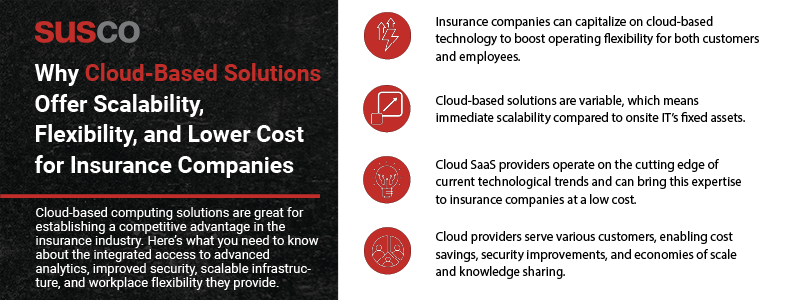Cloud-based computing solutions are great for establishing a competitive advantage in the insurance industry. Here’s what you need to know about the integrated access to advanced analytics, improved security, scalable infrastructure, and workplace flexibility they provide.

If your company has been looking for greater efficiency and productivity, cloud-computing solutions might be a great option. Cloud computing simply means outsourcing the high hardware and asset demands of an in-house IT solution to a software-as-a-service (SaaS) provider.
In the insurance business, this also means building and maintaining digital service offerings through connecting underwriters and customer service teams to customers requesting policies and making claims. Most insurance business interactions now occur digitally, so a cloud-based SaaS provider can act as the backbone of business operations.
This guide will cover what goes into cloud-based solutions, how they differ from fixed onsite IT assets, and the benefits – such as cost savings, security improvements, and economies of scale and knowledge sharing – that cloud-based options provide.
Bringing cloud-based solutions down to earth to improve business functions
There are many technological advances that can benefit your business, and cloud-based solutions are among the best in terms of ever-evolving industries such as insurance. These services span the entirety of a company’s computing needs, from backend and data management to applications, hosting, and designing the front-end (like analytics dashboards and customer portals).
Here is a quick look at how cloud-based solutions can have a business impact:
- Achieve agility in the cloud
Cloud-based insurance decouples operations from a fixed business location, opening up tons of operating flexibility. The freedom to hire and grant access to remote employees at a low cost means capturing the benefits of a global workforce, while improving employee satisfaction through hybrid and remote working options.
- Scalability becomes more attainable
In a similar way, scalability becomes both cheaper and easier. Previous in-house IT solutions required high fixed costs in the form of purchasing pricey new servers whenever business was booming. Cloud providers take on the risk of depreciating assets, achieving economies of scale through delivering services to multiple companies simultaneously.
- Business growth requires less time
Scaling business upwards can happen immediately, meaning no opportunity cost in the time it takes to expand IT assets. Employee flexibility is similarly reactive to circumstances, allowing valuable contributors flexibility in their personal lives at no cost to their productivity.
- Cost cutting becomes far more possible
IT isn’t cheap, particularly for organizations that house their own servers and design their own applications. Cloud-based solutions have flourished primarily due to the economies of scale and risk-shifting that can be achieved on behalf of their clients. This often means lower costs for the clients, with cloud providers producing economies of scale across various clientele to produce a profit. It’s a potential win-win for both provider and client.
- Risk is lowered
Taking on the burden of depreciated assets (which can break or malfunction), alongside the encumbrance of building inhouse software solutions (which are often evolving), is a significant series of present and future costs. Cloud providers take on both of these liabilities in exchange for a consistent variable price.
- Security gets a boost
Some of the most common boardroom objections to SaaS partnerships revolve around security. It’s tempting to want control of any critical operating asset to reside solely within the bounds of the organization, but cloud-based solutions providers have a significant edge in the security domain in most cases.
Insurance companies are tasked with the primary responsibility of delivering the optimal risk profile per any client situation imaginable, while the cloud provider can focus exclusively on the security and operability of the IT infrastructure. This means higher investment in researching risks, resolving security events (with 24/7 monitoring), and integrating optimal preventative measures on part of the SaaS provider.
- Advanced technology can be integrated
Presently, insurance companies can quickly achieve best-in-industry software standards. In-house teams do not need to experiment toward building an entire cloud-based software suite, which takes both time and capital. Instead, insurers can simply select a cloud-based solutions provider with a mature insurance industry template already in place and awaiting their specific needs and customization requests.
Staying competitive in a service industry means offering best-in-class experiences to customers. Cloud-based solutions providers specialize in a few industries and will already be experimenting with the latest technologies for insurers. They’ll be ready to implement them as soon as doing so becomes feasible and cost-effective.
Why analytics matter in terms of improving efficiency
One great example of advanced technologies being quickly integrated into a cloud-based insurance infrastructure is the rising trend in machine learning, AI, and advanced analytics. Insurance work is all about using complex risk profiles to construct fair policy premiums based on big data assessments and trends. This fits perfectly with the modern emergence of machine learning and AI.
SaaS providers have access to the latest, greatest, and fastest machine learning functionalities, which can all be built directly into the analytics reporting dashboards to update risk profiles in real-time. This is a massive advantage for insurance companies capable of working these learnings into customer relationships and strategic decision-making.
The only remaining challenge? Selecting the software solution provider best suited to add immediate value to your operation.
Modernize your claims management system with Susco’s help
Susco has been helping insurance companies like yours leverage the latest and greatest tools available in remote operations and cloud computing for over a decade. Our team has the expertise to reduce switching costs while selecting the very best partners in the industry.
Get started by discussing your unique needs with one of our expert agents, who can provide insight and advice on next steps. We look forward to seeing you in the cloud!